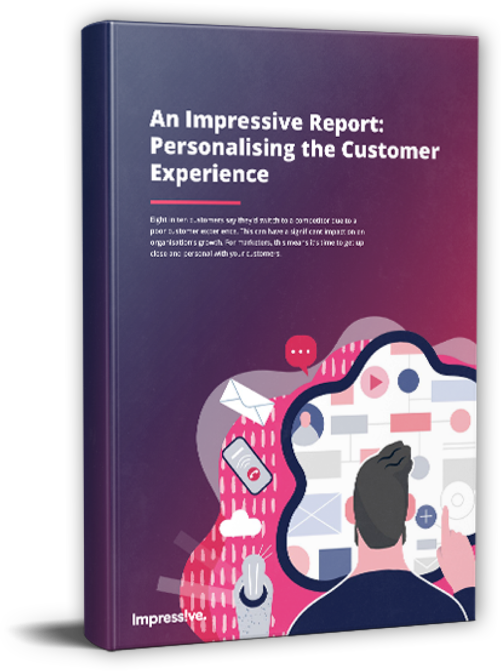Competition can be fierce in industries like retail and eCommerce. As a result, both large and small businesses need to find ways to gain an edge over their opposition.
One of the most effective strategies is to create a closer and more personalised relationship with potential and current customers. You want them to think of you as one of their best friends, not some long lost cousin, twice removed.
But how can you do this? Personalisation starts with finding and defining the preferences and needs of current and potential customers. With this information, you will then be able to predict what they want or need from you. From there, you can market specific products or services that meet these anticipated needs.
It sounds difficult, but I promise, you won’t need to acquire a crystal ball to inform your predictions. You can easily leverage data and technology to get your personalisation process well underway. For example, you can use a variety of different analytics tools to measure how individual customers respond to emails, offers or products on your website and then select future communications or promotions based on these interactions.
By providing personalised interactions, your customers are more likely to respond to your offers, not leave you on read and make more revenue-heavy purchases. You will also be building a relationship and loyalty with your customer base, as you are showing that you can predict and meet their needs, sometimes before they even know that they need it. It’s a win-win for everyone involved. So put away your tarot cards and get stuck into the data.
Why is personalised marketing important?
In this day and age, where technology acts as an extension of ourselves, customers expect personalisation. They prefer businesses that provide it and won’t shimmy up to businesses that don’t go the extra mile.
A recent study found that 60% of consumers would buy from a specific retailer again, simply because they offered a personalised shopping experience. Meanwhile, another study found that 91% of consumers prefer brands that recognise and remember them from past website visits. In addition to that, the media reports related to internet tracking and data privacy problems claimed that 70% of people are okay with sharing their data with a business if it improves their experience and the level of service. So although it is a little spy-y, customers don’t mind businesses acting as a fly on the wall – go forth and do your thing pixels.
Large retailers use tools like algorithmic advertising to offer website visitors specific products based on their past shopping and viewing activity. Luckily, there are tools for small and medium-sized businesses that offer the same level of personalisation.
Why do customers respond to personalised marketing?
The surveys mentioned above show that consumers not only respond to personalised marketing but they expect it and seek out retailers who provide it.
Why do they respond this way? Personalised marketing offers a curated experience, making shopping easier. I’m sure we can all relate to that. A report by Accenture also found that 40% of consumers left a website because they felt overwhelmed by having to navigate through all the choices. Convenience is key these days.
Personalisation can also help a customer feel more valued and well… special. Quick customer service via chatbots and a recall of previous purchases or shopping cart items are examples of things that can help build a value-oriented relationship. In addition, a more streamlined shopping experience and personalised promotional offers can inspire customer loyalty, even if algorithms power these features.
A personal touch can be important in some customer-business relationships. Still, most consumers value a fully-streamlined shopping experience, from coupons or promotions through curated website browsing to checkout and, if necessary, returns.
The research and surveys show that an overwhelming majority of shoppers prefer streamlined experiences and will leave retailers who do not offer personalisation.
What are the different ways to personalise marketing campaigns?
There are numerous ways by which you can personalise your marketing. The world is your personalised oyster so to speak. You can automate some of the processes, such as creating email sequences or text messages that get triggered by a specific action or piece of data.
Today’s marketing tools also make it possible to segment your customers into different groups or demographics, and you can then use various newsletters or promotions for advertising to each group.
Here is a look at some ways to personalise marketing.
- Personalised homepages – You can personalise the homepage of your e-commerce site using cookies. Each time the customer visits the site, they will receive specialised offers or be redirected to specific pages based on data from their previous visits.
- Automated emails – Automated emails include promotions, receipts, shipping notices, and other communications. The customer triggers these emails when they perform a specific action. For example, they might receive a tailored sequence of emails based on their data, past purchases, or demographic segment. We don’t like stereotypes, but in this case, go for gold.
- Targeted discounts – These include promotions offered to specific customers. These ads are often based on past purchases or browsing history on your site. You can also trigger rewards for customers who make regular purchases or reach a spending threshold on your site.
- Personalised videos or articles – You can also create videos or other media that provide information about specific products or services. These could be your own creations or third-party productions. The key to personalised media is to provide value and insight that the customer would not otherwise get.
You can also automate customer service by using chatbots and maintaining a customer relationship management (CRM) system to quickly call up necessary information about a customer.
Issues to be aware of for personalised marketing
Here are some challenges that could hamper your customer personalisation efforts.
- Gathering Data – To deliver a personalised experience, you will need to collect and store data about your customers. While most customers are willing to provide this information, some may see it as a drawback.
- Developing the right personalised messages – You can automate the email and text marketing process, but you still need to craft effective marketing messages. This is one area where the robots will never outsmart a human. Creating these ads for multiple segments can be challenging and time-consuming.
What will personalisation look like in the future?
Machine learning and smart content will continue to enhance personalisation. For example, algorithms will use data on past visits of a particular customer and select content or pages to show them when they return. Smart content can also tailor experiences based on location, gender, and other factors.
Automation will also continue to play an important role in online retail. Improvements in machine learning can already power customer service chatbots, which can answer basic questions and handle some customer issues without the need for a human representative – nice! These AI bots can connect customers who need additional services to a human when necessary.
Take customer personalisation to the next level
Personalisation is essential for retail success in the Digital Age. With machine learning and algorithm-powered websites, it will only become more vital in the coming years. Finding a partner who can help you take full advantage of all the personalisation tools that are currently available is crucial to retail success.






